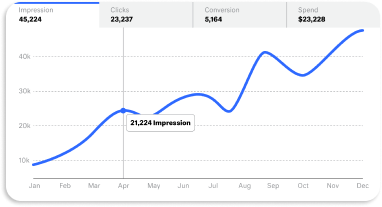What is third-party tracking?
Third-party tracking refers to the practice by which a tracker, other than the website directly visited by the user, traces or assists in tracking the user’s visit to the site. Third-party trackers are snippets of code that are present on multiple websites.
Third-party (3P) trackers import Quora campaign traffic to third-party tracking providers. Advertisers who use these providers are able to append trackers to their creatives to confirm the validity of ad traffic delivered by our ad server, such as click and impression tracking, and also receive additional tracking data that is generated by these tracking providers, for a more complete view of your advertising performance and other metrics.
How third-party tracking works
Third-party tracking involves the use of various technologies to collect data about users’ online activities across multiple websites. These trackers are typically embedded in website code or advertisements and gather information such as browsing history, clicks, and user behavior.
When a user visits a website containing a third-party tracker, the tracker saves a small piece of data, such as a cookie, on the user’s device. As the user navigates to other websites with the same tracker, the third-party can recognize the user and collect additional data on their browsing behavior. Over time, this cross-site tracking allows the third party to build a detailed profile of the user’s interests, demographics, and online activities.
Third-party trackers often share the collected data with advertisers, marketers, and other entities to facilitate targeted advertising, personalization, and audience insights. By analyzing user behavior across multiple websites, advertisers can serve more relevant ads and measure the effectiveness of their campaigns.
Types of third-party trackers
Common types of third-party trackers include:
Tracking pixels
Tiny, invisible images (often 1×1 pixels) embedded in web pages or emails that send data to a third-party server when loaded. Tracking pixels can capture information like IP addresses, browser types, and user actions.
Fingerprinting
A technique that combines various browser and device characteristics, such as screen resolution, installed fonts, and browser plugins, to create a unique identifier for a user. This method can track users even if cookies are disabled.
Cookies
Small text files stored on a user’s device that contain unique identifiers and other data. Third-party cookies are set by domains other than the website the user is visiting, enabling cross-site tracking.
Benefits of third-party tracking for advertisers
Third-party tracking offers several key advantages for advertisers seeking to optimize their campaigns and connect with their target audiences effectively. By leveraging data collected through tracking pixels, cookies, and other methods, advertisers can gain valuable insights into user behavior and preferences, enabling them to create more personalized and impactful ad experiences.
Viewability
Meaning at least 50% of the ad must be in view for at least one second for display ads, by MRC and IAB standards.
Brand safety
Keeping a brand’s reputation safe when they advertise online. This means avoiding placing ads next to content that may be considered “brand unsafe”, i.e. adult content, alcohol, hate speech, illegal activities and items, offensive language and violence etc.
Fraud protection
Identifying invalid traffic, or impressions generated by bots or any form of nonhuman traffic.
Ad targeting and personalization
One of the primary benefits of third-party tracking is the ability to deliver highly targeted advertisements based on users’ interests, demographics, and online activities. By analyzing data from cross-site tracking, advertisers can identify patterns and create detailed user profiles, allowing them to serve ads that are more likely to resonate with individual users.
For example, if a user frequently visits websites related to travel and has recently searched for flights to a specific destination, third-party tracking data can help advertisers serve them ads for hotels, rental cars, or travel packages in that location. This level of personalization can lead to higher engagement rates, increased click-through rates (CTR), and ultimately, better return on ad spend (ROAS).
Conversion tracking
Third-party tracking also enables advertisers to measure the effectiveness of their campaigns by tracking user actions beyond initial ad clicks. By implementing tracking pixels or cookies on their websites, advertisers can monitor user behavior after they leave the ad and visit the advertiser’s site, providing valuable data on conversions, such as purchases, sign-ups, or lead generation.
FThis cross-site tracking data helps advertisers attribute conversions to specific ad campaigns, ad formats, or audience segments, allowing them to optimize their strategies and allocate budgets more effectively. By understanding which tactics drive the most conversions, advertisers can refine their targeting, ad creative, and bidding strategies to maximize their return on investment (ROI).
Audience insights
In addition to improving ad targeting and conversion tracking, third-party tracking provides advertisers with rich audience insights that can inform their broader marketing strategies. By analyzing user behavior across multiple websites and platforms, advertisers can gain a deeper understanding of their target audiences’ interests, preferences, and online journeys.
These insights can help advertisers create more relevant and engaging ad content, identify new audience segments to target, and develop more effective marketing campaigns across various channels. For example, if third-party tracking data reveals that a significant portion of an advertiser’s target audience is interested in sustainability and eco-friendly products, the advertiser may choose to develop more green-focused ad creative and messaging to appeal to this segment.
Moreover, third-party tracking data can help advertisers benchmark their performance against competitors and industry standards, providing valuable context for evaluating the success of their campaigns. By comparing their own audience data with broader market trends, advertisers can identify areas for improvement and stay ahead of the curve in their respective industries.

Image generated using Poe, Quora’s AI chat app.
While the benefits of third-party tracking for advertisers are clear, it is essential to balance these advantages with the growing concerns around user privacy and data protection. As privacy regulations evolve and users become more aware of tracking practices, advertisers must prioritize transparency, consent management, and responsible data use to maintain trust and comply with legal requirements. By leveraging third-party tracking data in an ethical and privacy-compliant manner, advertisers can continue to deliver effective, personalized ad experiences while respecting users’ rights and preferences.
Privacy concerns and regulations
The widespread use of third-party tracking has raised significant concerns about the collection, sharing, and use of personal data. Users are increasingly worried about their online privacy being violated and their data being exploited without their knowledge or consent.
Key privacy concerns include:
- Extensive collection of user data across multiple websites and platforms
- Sharing of data among various third parties, such as advertisers and data brokers
- Lack of user control and transparency over data dissemination and use
To address these concerns, governments have introduced data protection regulations like GDPR in the EU and CCPA in the US. These regulations require companies to:
- Obtain explicit user consent for data collection and processing
- Provide users with the right to access and delete their data
- Implement strict data security measures
- Disclose their data practices in clear, concise privacy policies

Image generated using Poe, Quora’s AI chat app.
Major web browsers have also taken steps to limit third-party tracking:
- Safari’s Intelligent Tracking Prevention (ITP) blocks third-party cookies and limits first-party cookie lifespan
- Firefox’s Enhanced Tracking Protection (ETP) blocks known third-party trackers
- Google Chrome plans to phase out support for third-party cookies by 2024
As privacy concerns and regulations shape the digital landscape, advertisers and publishers must adapt their tracking practices to maintain user trust and comply with legal requirements. This may involve:
- Implementing transparent consent management solutions
- Exploring privacy-preserving technologies like contextual targeting
- Investing in first-party data strategies that prioritize user control and transparency
By addressing privacy concerns and working towards a more sustainable, user-centric ecosystem, the industry can continue to leverage the benefits of data-driven advertising while respecting users’ privacy rights.
Managing user privacy and consent
As the digital advertising landscape evolves, prioritizing user privacy and obtaining proper consent for data collection and usage is crucial. Quora is committed to maintaining a transparent and user-centric approach to data privacy, ensuring that users have control over their personal information and how it is used by advertisers.
Quora’s privacy policy
Quora’s Privacy Policy outlines the company’s data collection, sharing, and usage practices. The policy clearly states that Quora may collect various types of user data, including:
- Information provided by users during account registration and profile creation
- Data collected through user interactions with the platform, such as questions, answers, and comments
- Information from third-party sources, like social media accounts and advertising partners
The policy also explains how this data may be used for personalization, ad targeting, and measurement purposes. Quora emphasizes its commitment to data security and user privacy, detailing the measures taken to protect user information and comply with applicable laws and regulations.
User opt-out options
Users have the option to opt-out of data collection regarding browsing activity via Pixels as described in Quora’s Privacy Policy and Pixel Privacy Terms. This setting is tied to the user’s cookies, and, unless they are logged in to the Quora Platform, will only be effective on the browser for which they have performed the opt-out. In certain jurisdictions, users also may have the right to opt out of personalized ads, though Quora may still show ads that are contextually related to the content that they are viewing. For more details about opt-out choices, see our Cookie Policy.
Advertisers must respect users’ privacy choices and ensure that their tracking practices align with these preferences. When implementing third-party tracking on Quora Ads, advertisers should:
- Obtain user consent for data collection and usage, where required by applicable laws (e.g., GDPR, CCPA)
- Provide clear and accessible information about their data practices, including the types of data collected and the purposes for which it is used
- Honor user opt-out requests and cease data collection for users who have exercised their right to opt-out
- Implement appropriate data security measures to protect user information from unauthorized access or misuse
By adhering to Quora’s Privacy Policy and respecting user opt-out choices, advertisers can build trust with their target audiences and foster a more transparent and privacy-focused advertising ecosystem.
Implementing third-party tracking on Quora ads
First, get started with the Quora Pixel*. Quora’s Pixel offers enhanced reporting, however, you can also validate metrics with a third-party measurement partner for greater accuracy and assurance. Quora Ads allows advertisers to leverage third-party tracking to gain valuable insights into the performance of their ad campaigns. By implementing tracking pixels, cookies, and other tracking technologies, advertisers can measure key metrics like viewability, brand safety, and fraud protection. This section will guide you through the process of setting up third-party tracking on your Quora ad campaigns. For more information, check out the Third-Party Pixel Tracking Partners support article.

Step 1: Choose a third-party tracking partner
Quora Ads integrates with several third-party tracking partners, including IAS, DoubleVerify, CM360, Nielsen, Lucid, Disqo, and Flash. Select a partner that best suits your needs and sign up for an account with them. Please reach out to one of these partners to set up an account for third-party tracking.
Step 2: Generate tracking pixels or tags
Work with your chosen third-party tracking partner to generate the necessary tracking pixels or tags for your ad campaigns. These tags will typically include unique identifiers and other parameters to help track your ads’ performance across Quora.
Step 3: Implement tracking in Quora Ads Manager
Once you have your tracking pixels or tags, navigate to the Quora Ads Manager to implement them in your campaigns:
- Open the campaign where you want to add third-party tracking.
- Click on the “Ads” tab and select the ad you wish to track.
- Click the “Edit” button and scroll down to the “Tracking” section.
- Paste your third-party tracking pixel or tag into the appropriate field (e.g., “3rd Party Impression Pixel” or “3rd Party Click Pixel”).
- Save your changes and repeat the process for any other ads you want to track.
Step 4: Verify tracking implementation
After adding your tracking pixels or tags, verify that they are firing correctly using your third-party tracking partner’s reporting tools or by consulting with their support team.
Best practices and tips
- Implement tracking pixels on all ads within a campaign for comprehensive performance insights
- Use unique tracking pixels for each ad or ad format to granularly measure performance
- Regularly monitor your tracking data to identify optimization opportunities and make informed decisions about your ad strategy
- Keep your tracking pixels up-to-date and replace them if they become outdated or invalid
By following these steps and best practices, you can effectively implement third-party tracking on your Quora ad campaigns and gain valuable insights into ad performance, user engagement, and conversion metrics. Leveraging these insights can help you optimize your campaigns, target the right audiences, and maximize your return on ad spend.
Please note the Quora Ads Support Team does not have visibility into our partners’ platforms. If you need assistance with generating tags or checking your tracking URLs, please defer to the respective partner’s support team.
You can keep updated on our most current Brand Safety partners in the Quora Partner Marketplace.
*For more information, you can also refer to our Help Center articles on Quora’s Pixel and our Third-Party Pixel Tracking Partners.
Frequently asked questions about Quora third-party tracking
What ad formats and placements are supported for third-party tracking?
Quora currently supports third-party tracking on Text, Image and Promoted Answer ads in Feed and Question page placements. Quora does not currently support third-party tracking on Video ads and ad placements in Digest emails.
Where do I direct questions about the third-party reporting and partner dashboard?
If you have questions about reporting or getting access to a dashboard, please contact the respective partner page as we do not have visibility into our partners’ platforms.
Can you wrap the tracking URL with multiple tags? If this happens, what are the implications for pixel partners that we don’t currently support?
Yes. Advertisers can wrap their trackers in more than one tag, but we won’t be able to validate if the pixel is firing correctly, if we do not currently support measurement with the partner.
Can I use these integrations for App Install campaigns?
Quora’s Pixel Tracking Partners support click and impression tracking. To measure app installs, we recommend working with one of our verified Mobile Measurement Partners (MMPs).
Related Content

Marketing FAQs
Book a consultation with a Quora expert
![]()








